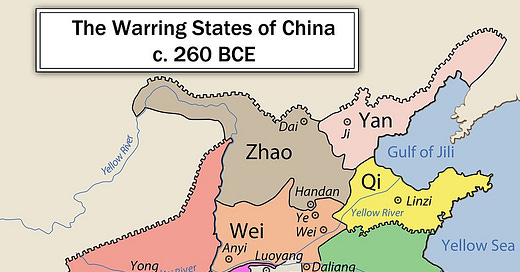The Warring States period in Chinese history (c. 475 – 221) was a momentous era during which important bureaucratic, military, and legal reform as well as political consolidation taking place. Political intrigues, punctuated by vicious military campaigns and brutal battles, characterized the epoch.
Political geography
Seven states dominated the period.
Qin, located in the far west, with its core in the Wei River Valley and Guanzhong. This geographical position offered protection from the other states but limited its initial influence.
The Three Jins, situated in the center on the Shanxi plateau, were the three successor states of Jin. These were:
Han, positioned in the south, along the Yellow River, controlling the approaches to Qin.
Wei, based in the middle, roughly modern eastern Henan Province.
Zhao, the northernmost of the three, located roughly in modern southern Hebei Province as well as northern Shanxi Province.
Qi, located east, centered on the Shandong Peninsula.
Chu, based in the south, with its core territory around the valleys of the Han River and, later, the Yangtze River.
Yan, positioned in the far northeast around modern Beijing.
Han and Qi alliance
In 351 BC, Shen Buhai became chancellor of the Han state. He instituted significant legal and military reform, thereby strengthening Han. In the process, he threatened the relative hegemony of the Wei state.
Therefore, Wei attacked Han in 342 BC, and the latter turned to its ally Qi for help. Sun Bin, a supposed descendant of Sun Tzu, advised the king of Qi to provide military aid for Han, but only dispatch troops when the army of Wei had been depleted after prolonged fighting to preserve Qi own strength.
Han was misled to believe that it could rely on the army of its ally Qi, and thus fought without reserve. After a year of resistance, Han was no longer able to resist and asked for help from Qi a second time. Instead of sending troops to save Han directly, Sun Bin counseled his king to aim for the capital of Wei, Daliang. This culminated in the destruction of the Wei army in the battle of Maling. The collapse of Wei army brought no consolation to the state of Han since Han had become a wasteland.
Looking back, Qi had used Han as a proxy in its war against the hegemon Wei.
Conclusion
Readers probably have no visceral reaction to neither the destruction of the Han state nor the collapse of the Wei army. But their modern rhymes might elicit different feeling.
Thank you for reading. I would love to read your comments and feedback. And hope that you will share it with your friends, if you find any lesson in it.





Trying to subdue the Burmese was a problem for China at times, and that fleet to conquer Japan...
Lots to learn from Chinese history, and the Chinese study it well.
Attacking the Vietnamese in our lifetimes taught China another lesson...
Diplomacy is better.
Art Of War, Sun Tzu https://en.wikipedia.org/wiki/The_Art_of_War
The most studied military book still today.